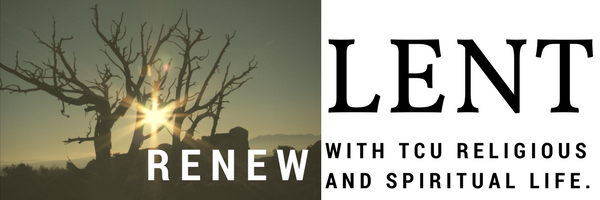
Hello TCU Family,
Our first Holy Week devotional is written by Dr. David Grant, a professor in the Department of Religion. Dr. Grant’s areas of focus include Modern Christian Theology, Philosophical Theology, and Interactions of Religion and Science. I personally had the privilege of working with Dr. Grant as a Religion major at TCU. 22 years later, I remain grateful for the time I spent in his classroom. To learn more about Dr. Grant’s work at TCU, click here . May his words hold space for you to encounter what is holy this week.
Reading
Mark 14: 35-36, “And going a little farther, he threw himself on the ground and prayed that, if it were possible, the hour might pass from him. He said, “Abba, Father, for you all things are possible; remove this cup from me; yet, not what I want, but what you want.” (NRSV)
Reflection
Friedrich Schleiermacher was a German theologian in the early 19th century, often referred to as the father of modern theology. Years ago, I read a sermon that he preached that changed my whole understanding of prayer; he used as his scripture this passage from Mark’s gospel.
First, Schleiermacher points out that Jesus prayed that the cup of suffering and death he was about to face might be removed; he didn’t want to die. And of course, we know from the rest of the story that he did suffer and die on the cross. Schleiermacher then says that we should learn from Jesus’s prayer that our petitions to God may not bring about the outcomes we desire.
Second, he notes that Jesus qualified his request by accepting that what God wants ought to be what we want. Jesus, in essence, prays that his will might be aligned with God’s will.
Third, Schleiermacher says that, following Jesus’s example, it’s okay for us to pray for what we want—just don’t expect that our prayers will bring about the outcomes we desire. Moreover, don’t put too much weight on instances when things we pray for do happen, for just as many times our prayers will not bring about the results we ask for.
Schleiermacher took seriously two attributes of God: that all that happens is under God’s sovereignty and that we can trust that God’s intentions are always directed to the good of creation. We must in faith trust that, in spite of our desires and our finite, limited perspective, God is active in all that befalls us, working toward the good of creation, even when we can’t discern how this can be the case when we are personally suffering and in pain.
Let us follow the model of Jesus and in our prayers and always end them with “not what I want, but what you want.”
Prayer
Gracious God, as we approach the remembrance of Jesus’s crucifixion this week, remind us that in his darkest hour, despite his own desires, he could put his trust in you. May we align our will with your will as we pray, not what we want, but what you want. Amen

Comments